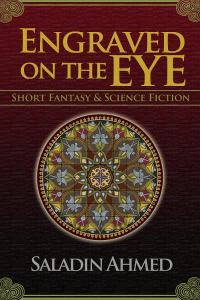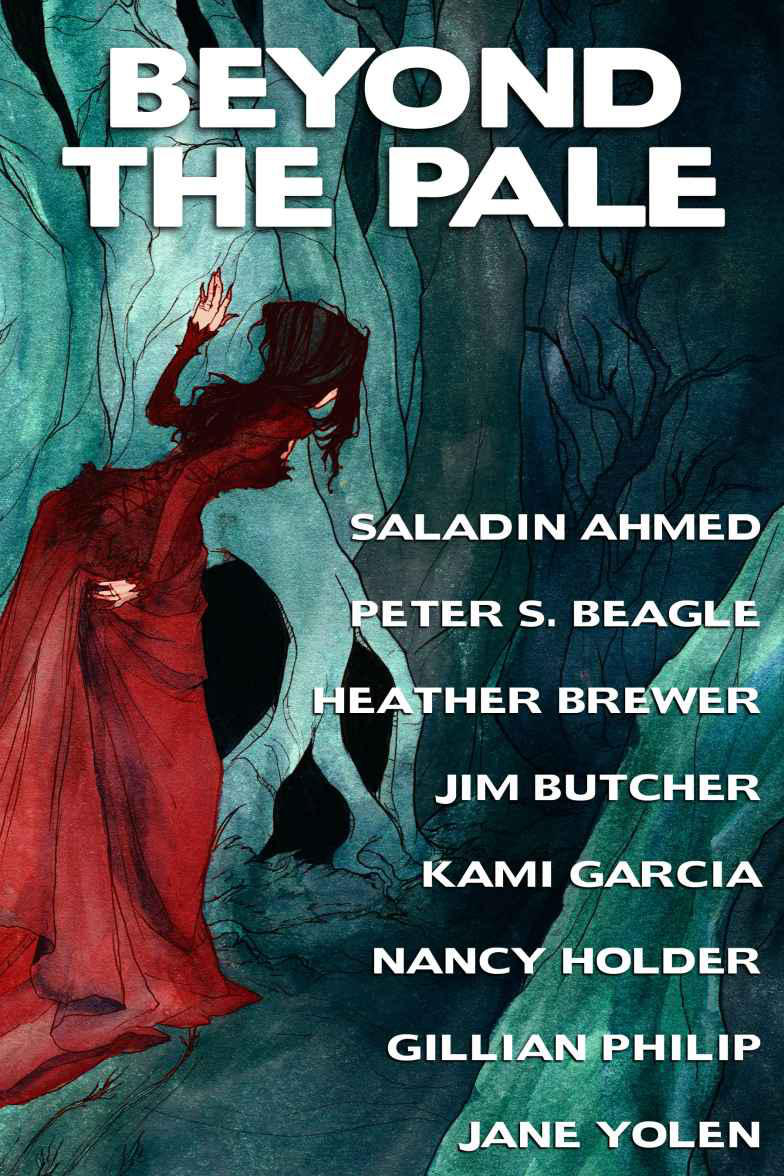Saladin Ahmed
Books: Fantasy
Engraved on the Eye (2012)
Beyond the Pale: A Fantasy Anthology (2014)
Engraved on the Eye (2012)
 I actually follow on Twitter (@saladinahmed) and when I saw he had a collection of short stories available, snapped it up, because I love short stories.
I actually follow on Twitter (@saladinahmed) and when I saw he had a collection of short stories available, snapped it up, because I love short stories.
These stories are set in the East, which, I fully admit took a bit for me to get used to–I've not yet found a good Middle Eastern folklore collection, so the feel of the stories was quite different from other things I've read. This is a good thing, because I like broadening my horizons, but it was odd for me to have very little frame of reference for the stories.
I've read these stories over the course of several months, so I have more a vague impression of enjoyment rather than specific details.
- Where Virtue Lives
- Hooves and the Hovel of Abdel Jameela
- Judgment of Swords and Souls
- Doctor Diablo Goes Through the Motions
- General Akmed's Revenge?
- Mister Hadj's Sunset Ride
- The Faithful Soldier, Prompted
- Iron Eyes and the Watered Down World
The anthology opens with Where Virtue Lives. Doctor Adoulla Makhslood is a ghul hunter–the best in Dhamaswaat. UNfortunately for him, not only does he have to hunt down and find a ghul that kidnapped a woman, and a young dervish who wants to be trained as a ghul hunter. "He looked like one who had killed, but did not yet value life." THAT is a very interesting insight.
The second story is "Hooves and the Hovel of Abdel Jameela" and tells of the Professor, who has been exiled from the Caliph's court, and it is there that a strange man, the reculse Abdel Jameela, requests that he come out and heal his wife.
In the story "Judgment of Swords and Souls", Layla bas Layla is a Dervish, but one whose stubbornness is tearing apart her community. What is more important: debts to family or the good of a divided community?
The story "Doctor Diablo Goes Through the Motions" amused me very much. It really should have been in The Mad Scientist's Guide to World Domination.
I'll admit that although the story "General Akmed's Revenge?" was a good story, I didn't much care for it–it was too sad. A young man wants to be an actor, but the only parts open are bit parts of terrorists and other Arab men to be killed by the righteous American heroes. And yes, that's both deeply true AND extremely depressing.
But it had this bit, that I've read somewhat of elsewhere, but not quite like this.
Muhammad had worked at kebab stands in Sweden and West Germany. There were big blonde men in those places. But there was a way of being big and blonde that only American men had.
The story "Mister Hadj's Sunset Ride" was a different kind of wild west story, the story of a boy who is half white and half Arabic, making his way in the world. "It can be hell, sometimes, being different things to different folks. But it cab be right useful too."
He relates the story of the death of Mister Hadj, and it has a point I quite liked:
(M)y momma taught me that another man's religion was like another man's wife–none of my goddamnn business.
I really like that.
"The Faithful Soldier, Prompted" was a SF story, and as such, not one I particularly cared for. No, I don't know why I react that way to SF stories, I just don't much care for them.
The final story is "Iron Eyes and the Watered Down World." Zok Ironeyes and his companions are south, in a world that is soft and easy, filled with soft cowards–at least compared to what Zok remembers of when he was young. I quite liked this story, and was glad the anthology closed on this rather than the previous story.
Published by Ridan Publishing
October 2013 | Rating: 8/10
Beyond the Pale: A Fantasy Anthology (2014) edited by Henry Herz
 I probably started reading this right after it came out, and got hung up on a single story. Two years later I decided to skip through the stories that didn't interest me and finish the anthology.
I probably started reading this right after it came out, and got hung up on a single story. Two years later I decided to skip through the stories that didn't interest me and finish the anthology.
- "Hooves and the Hovel of Abdel Jameela" by Saladin Ahmed
- "The Children of the Shark God" by Peter S. Beagle
- "Misery" by Heather Brewer
- "Shadow Children" by Heather Brewer
- "Even Hand" by Jim Butcher
- "Red Run" by Kami Garcia
- "Pale Rider" by Nancy Holder
- "Frost Child" by Gillian Philip
- "South" by Gillian Philip
- "A Knot of Toads" by Jane Yolen
- "The Adventures of Lightning Merriemouse-Jones" by Nancy & Belle Holder
The noun "pale" refers to a stake (as in impaling vampires) or pointed piece of wood (as in a paling fence). "Pale" came to refer to an area enclosed by a paling fence. Later, it acquired the figurative meaning of an enclosed and therefore safe domain. Conversely, "beyond the pale" means foreign, strange, or threatening.
"Hooves and the Hovel of Abdel Jameela" by Saladin Ahmed was one of the stories I liked. A young man of education and learning–a court physician–is all but exiled, but finds patients even in his exile.
(A) man is not merely who he is, but what he has.
Published by Birch Tree Publishing
January 2017 | Rating: 7/10
